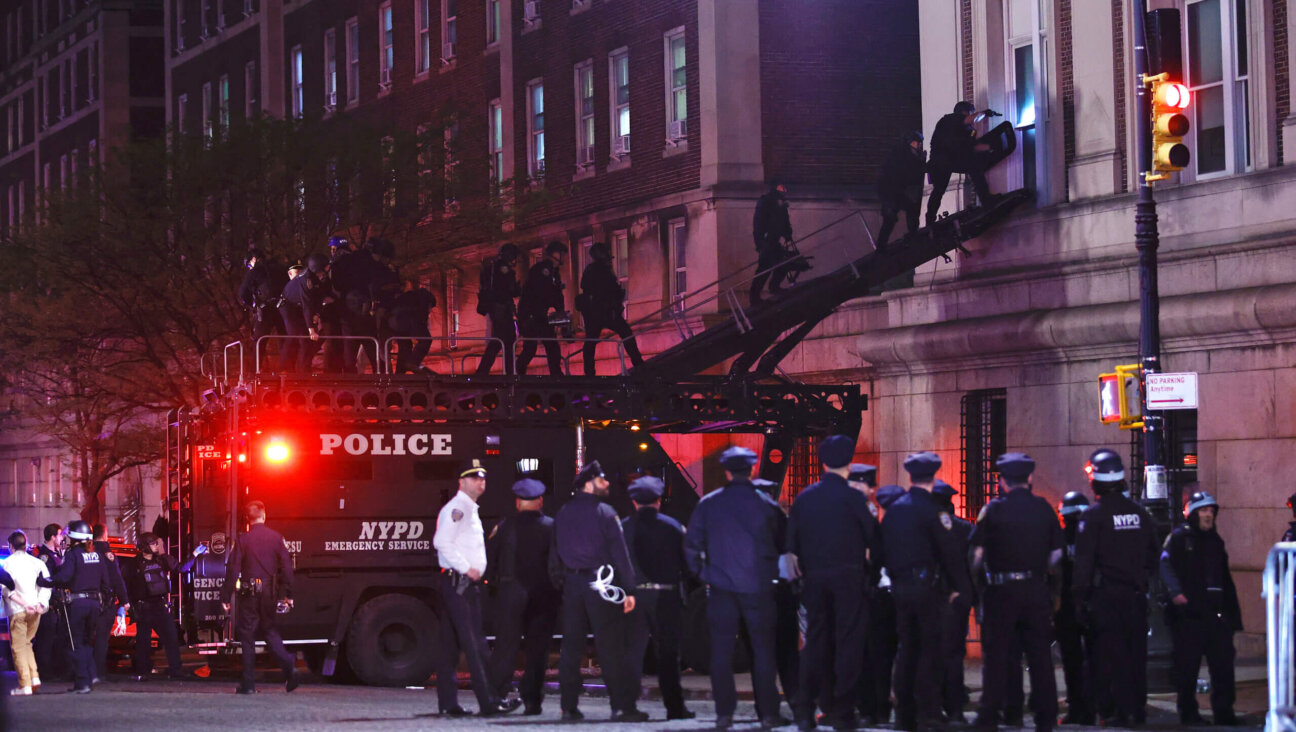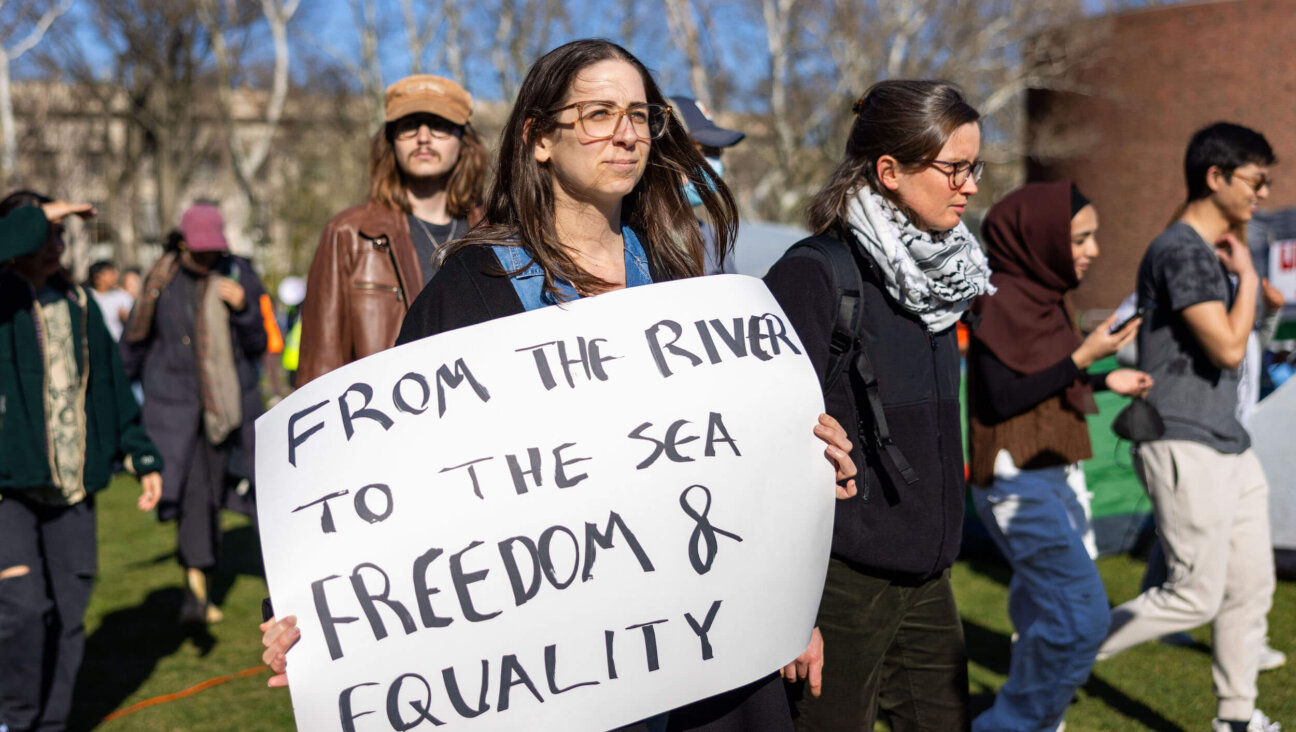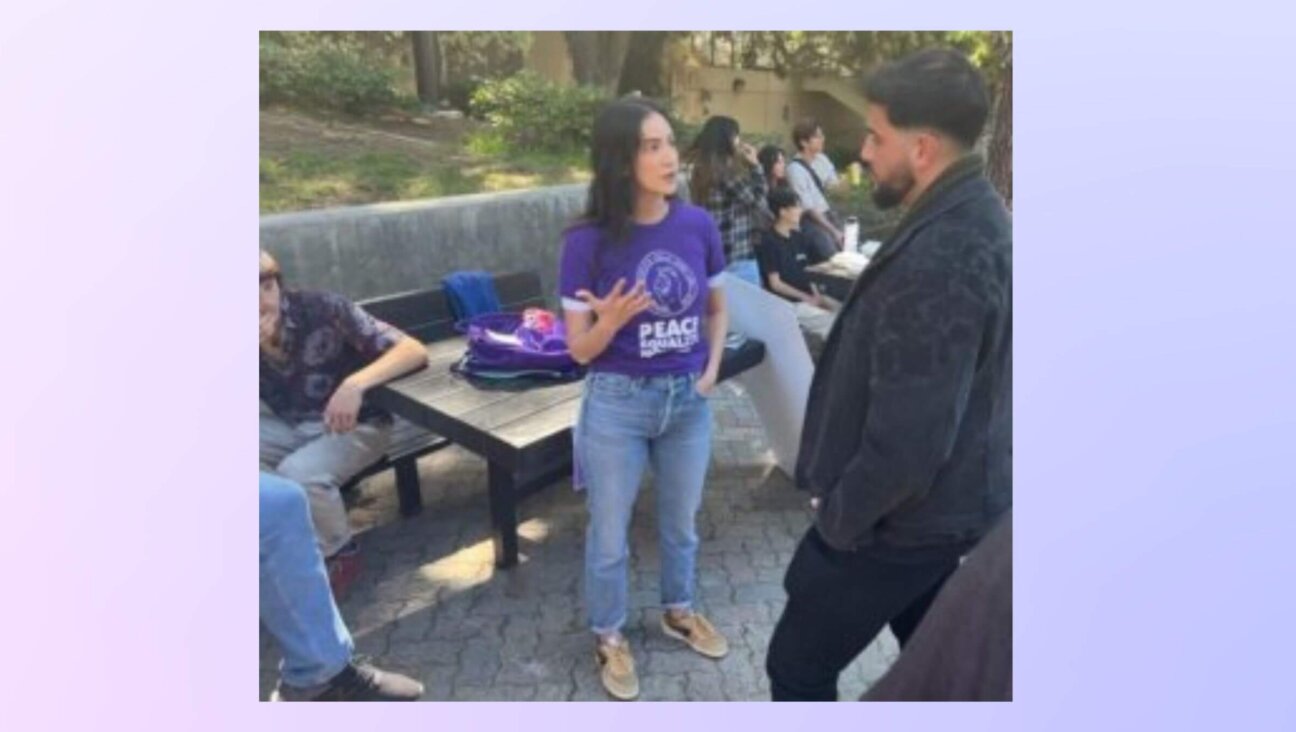The Ukrainian Revolution’s Unlikely Street-Fighting Rabbi

The following interview is with Natan Khazin, commander of a Jewish squadron of fighters in the Ukrainian revolution that took place in Kiev’s Maidan, or central square. It aired on March 20 on Espreso TV, a popular Ukrainian Internet television station and was the first time that Khazin disclosed his identity in public. Khazin was interviewed by Mykola Veresen, a well-known Ukrainian journalist, who was the BBC’s correspondent in Kiev for many years.
The yarmulke-wearing Khazin, a veteran of the Israel Defense Forces and an ordained rabbi, is representative of many young Ukrainian Jews who are Zionist, religiously observant and at the same time strong Ukrainian patriots. Some of them refer to themselves humorously as Zhido-Banderists — a fusion of the pejorative term for “Jew” with the name Stepan Bandera, leader of the Organization of Ukrainian Nationalists, which fought for Ukrainian independence during World War II. The organization’s forces also participated in the massacre of Jews, so the term Zhido-Banderist is self-consciously ironic.
The interview has been edited and condensed.
Mykola Veresen: How did you end up on Maidan?
Natan Khazin: After the barbaric and unprecedented dispersal of demonstrators on November 30, I went to the enormous rally of 1 million people [the following Sunday].
But you became a commander.
It happened very fast. After the first barricades on Hrushevsky Street, when there was talk of storming the parliament, I went over to people and asked: “What’s the main objective? Where are we headed? What are we doing?” After about half an hour, I realized that there was no one in charge on the ground. People didn’t know what to do. They only knew that they must press forward. I asked some of the people there: “Do you know the correlation of forces? Do you know that in order to storm a building, when both sides are equally armed, the storming side needs to have three times as many people?” They answered “no.” When I asked, “What’s the tactical plan?” they didn’t have one.
How did you know about such things?
I have extensive combat experience. I served in the Israel Defense Forces. I was an officer. I know something about offensive and defensive maneuvers under conditions of urban combat.
If it isn’t confidential, where did you serve?
In the Gaza Strip. I know what it’s like to move down a street with people shooting, throwing stones or burning objects.
You are originally from Kiev?
No, I’m from Odessa.
You immigrated to Israel, served in the army there and returned to Ukraine?
Yes. I never imagined that I would put my combat knowledge to use in quiet and peaceful Kiev. People said to me: “In Israel, in the Middle East, things are bad, there’s a war. Come here, stay here and live in peaceful Kiev.” I believed they were right.
How naive of you!
I’ll tell you honestly, at first I was an observer of the clashes, then I was an adviser. But within hours I became an active participant, and people recognized that I had experience. I was in charge of several operations on Hrushevsky Street. And I came to realize that this was my war.
What led you to that conclusion?
People were standing in the streets, unarmed. The authorities were acting like the Kremlin, like Putin against demonstrators. In all the years of Ukrainian independence, I’d never seen so much force used against unarmed civilians — so many vehicles, so many security forces. I decided that I should express my position as a citizen, and help the people that were fighting the regime.
So I went to participate in the storming of the Ukrainian House [Kiev’s central convention center]. I came prepared, knowing that the assault would soon begin. It started on Friday night. After going to synagogue and finishing the Sabbath prayers, I went to Maidan, to the Ukrainian House. We thought there were 40 to 50 soldiers inside, but there were 150 instead — fighters, officers and snipers. After the first three demonstrators were killed, I saw the thirst for revenge in the eyes of my comrades in arms.
I have a question. I really don’t know the answer, and many people will be curious. Can Jews engage in combat on the Sabbath?
If it’s necessary, Jews fight on the Sabbath. Protecting human lives is the highest value. On the Saturdays when I served in the civilian self-defense at Maidan, I shot, traveled in vehicles, I spoke by telephone — I did everything that I would usually not allow myself to do. The Saturdays at Maidan were the first Sabbaths that I violated in 20 years, in order to protect the lives of civilians.
You asked a rabbi, and the rabbi said it was permitted.
I didn’t ask a rabbi, I knew the answer. I have rabbinic ordination, and I could answer the question for myself. I recommended to many other people to participate in self-defense operations on the Sabbath.
Another question: Who was the first person to call himself a “Zhido-Banderist”? Perhaps you coined the term?
No. The copyright to that term is unknown. But as soon as I heard it, I said that I’d rather be called a “Zhido-Banderist” than a “Zhido-Muscovite.” But in all seriousness, in the two and a half months I spent at Maidan, I never heard anyone use the word zhid — not regarding me and not regarding anyone else.
To tell you the truth, during the first few days, I didn’t tell people I was Jewish. Like Queen Esther, who didn’t say anything about her origins. But gradually I decided to come out of the shadows, and began to tell people about my “Zhido-Banderist” origins, about my “Israeli aggressor” past and future. I was shocked by the reaction. People called me “brother.” Everyone. Simply “brother.” I have photographs of me together with different fighting units, from the ultra-nationalist “Svoboda” and other groups. They always greeted me with “Shalom.” And now when I meet them on the street, in civilian clothes, we hug each other.
I read an interview with Natan Sharansky in Israel. They asked him: “What do you think about those Ukrainians? They are such bastards, they hate Jews, right?” And he answered: “Well, that they hate Jews isn’t so. I sat in the Gulag for many years together with Ukrainians, and I didn’t particularly see that. And as for the events in Ukraine, I’ll tell you: I would do anything for the sake of my homeland Israel, for my Jewish people. So I don’t understand, why should Ukrainians be any worse than me, or than anyone else, fighting for their homeland?”
Something changed in me when I saw people on Hrushevsky Street who were ready to sacrifice themselves. A few young men on the street were in the line of fire, and I asked them to move. They said to me, “We’ve come here to die.” When you see before your eyes people who have come to die for the sake of the homeland, this made me feel close, and united with them. I know what it means to be ready to die for the homeland.
Did you have contact with the Israelis? Did they interview you?
Of course. Israeli radio and television stations interviewed me, anonymously. I didn’t want to publicize who I was until very recently. Generally, they viewed what I was doing in a positive spirit, as a good sign. But the Israeli government has displayed an ambiguous attitude toward the events.
Yes, we know that.
This is in the context of the Israeli Foreign Ministry flirting with Moscow. Israel, I’m ashamed to say, has not taken a clear-cut position in support of Ukraine. It hasn’t called the aggression by its name. It hasn’t condemned the annexation of Crimea. Who should understand better than us the meaning of land? We have a slogan in Israel: “Tov lamut be-ad artsenu,” “It’s good to die for our land.”
While, unfortunately, there isn’t governmental support, there is the support of many people in Israel. Lots of young men born in Ukraine, and who served in combat units of the IDF, found out about what I was doing and wrote to me on Facebook. “We’re ready to come and help.” During the hardest days, “We’re ready to come and help.” But there were also a few people who wrote to me: “Why should you die for Ukraine? It’s better to die for Israel.”
At first, the attitude of most Ukrainian Jews toward what I was doing was negative. People scolded me: “What are you doing? You’re disgracing us. You don’t represent the Jewish community, you represent only yourself.” After the bloodshed and the death of many people, including members of my squadron — we lost some very special people — the attitude changed. The community began to take a more active role; they organized assistance. They sent nine heavily wounded people to Israel, and two of them, thank God, have already returned in good shape.
I want to add that in this process, I crossed several thresholds. When people standing next to me on Institutskaya Street were shot before my eyes, and the body of one comrade after another hit by gunfire was dragged away, I lost my last ethnic-psychological distance. After seeing what I saw, I decided that I needed to act in a hard, tough way, without any compromise toward the enemy.
Interview translated and edited by David E. Fishman, director of the Jewish Theological Seminary’s program in the former Soviet Union, Project Judaica.
A message from our Publisher & CEO Rachel Fishman Feddersen

I hope you appreciated this article. Before you go, I’d like to ask you to please support the Forward’s award-winning, nonprofit journalism so that we can be prepared for whatever news 2025 brings.
At a time when other newsrooms are closing or cutting back, the Forward has removed its paywall and invested additional resources to report on the ground from Israel and around the U.S. on the impact of the war, rising antisemitism and polarized discourse.
Readers like you make it all possible. Support our work by becoming a Forward Member and connect with our journalism and your community.
— Rachel Fishman Feddersen, Publisher and CEO























